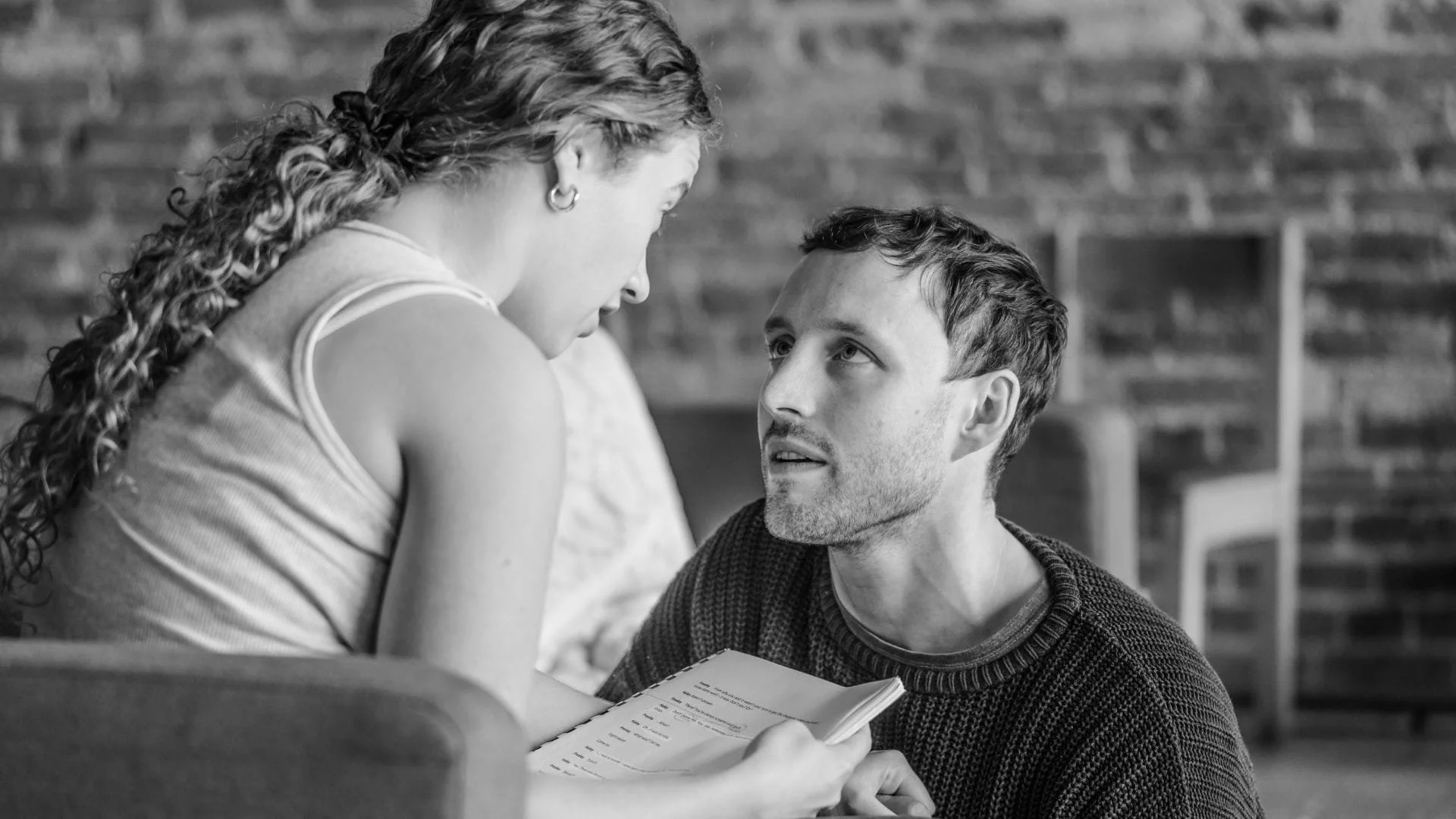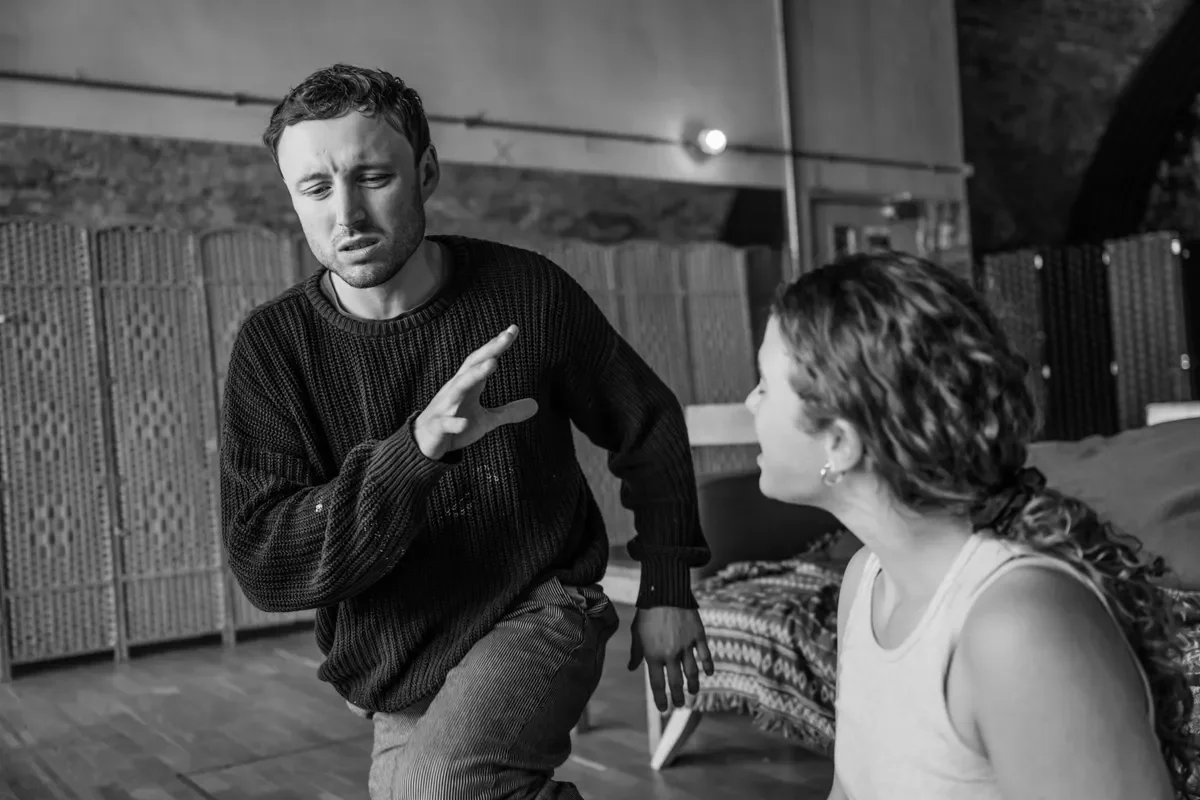Inside the Rehearsal Room with Pitchfork Disney at King’s Head Theatre
Written by Ziwen for Theatre & Tonic
After first appearing on the stage of the Bush Theatre in 1991, and following numerous interpretations including performances overseas in other languages, Phillip Ridley’s play The Pitchfork Disney has now arrived at the King’s Head Theatre, directed by Max Harrison.
Set on a night in East London, the story follows twin siblings Presley (Ned Costello) and Haley (Elizabeth Connick). Ever since their parents died in a tragic accident ten years ago, the two have shut themselves away from the world, finding solace in chocolate, medication, and vivid fantasies of nuclear disaster. One evening, Presley sees a mysterious and striking stranger (William Robinson) along with his unsettling companion (Matt Yulish). While Haley sleeps, Presley makes a fateful decision, and he invites their worst nightmare into their home.
Before this gripping piece of in-your-face theatre officially opened, I was invited to preview a glimpse of the unique energy it brings. At the event, director Max Harrison had the four actors each read an excerpt from Play One, also written by Phillip Ridley. This clever use of material outside the main script offered the audience a vivid sense of each character’s personality and emotional state.
Afterwards, I had the opportunity to speak with both the actors and the director about the script, the characters, and the rehearsal process. When asked what drew them to the production, they all spoke highly of Phillip Ridley’s writing, offering glowing praise for the script.
Max: “The script has so many mysteries to it. It does not reveal its secrets for a while so you’re spending a lot of the time trying to figure the stuff out. Like a good horror film, there’s always a sense of “what’s going on there”, “what’s inside the house”, “what’s the nature of this haunting that’s happening”, and the play feels very much like that. The twins are haunted by something even if that is not a ghost, and you’re trying to figure out what that is, it’s got this really compelling dramatic propositions to it. That was the first thing. And the second thing is how resonate the themes feel, this thing of sudden violence bursting in, the fear of the outside world, the fear of germs, it feels very now. So there is the resonance on the level beyond just the compelling story of it.”
William: “Max said something quite early in the rehearsals that it just takes one act for you to completely reframe how you see the world, and I think it feels really true for the play. I think that’s what drew me to the play. I don’t think there is much world being created like this.”
Matt: “I think this play really expose itself of our darkest fears, insecurities, our inabilities to get up and go outside, also reflecting societies through these characters backwards.”
Ned: “You sort of forget that you’re reading it and you just finished the play. So often you’re looking for reasons to do it and looking for reasons not to do it. But when you start reading this play in particular you just want to finish it. The character relationship is so fascinating, unique, and confronting, but also deeply moving and human. There is this love, tenderness, and brokenness. As an actor doing it, there is so much pushing forward, and I think the audience will feel that as well. The way Max works brings the best out of Phil’s work, and it’s such a great company as well.”
In addition to the script itself, Elizabeth also highlighted Max’s direction of the piece.
Elizabeth: “Even just from auditioning, you get a sense of the room you’re gonna be in. His process is so unique and exciting and really focusing on getting the best out of what the actors are capable of, and it’s just honestly so exciting, fruitful, and liberating.”
Therefore, I continued to ask them about their audition and rehearsal process. This was their response.
Elizabeth: “The uniqueness about their audition process is that they have an actor to read with you in the audition, so it immediately feels like a rehearsal. You get so much out of it even if you don’t get the job. Max uses a lot of improvisations. During the audition, he was like “okay put your monologue down and improvise it”. And your initial reaction was like “oh my god”. But as soon as you’re on board, you know what you’re in for. And if you love that way of working, you can’t imagine working in another way now.”
Ned: “After you audition in such a way, when you come in on day one, you will immediately understand where you need to be and where you need to go from there. There is already so much trust among the actors. You felt like you’re going in having already done two weeks of rehearsals. That’s so efficient, demanding and rewarding.”
At this point, I couldn’t help but grow curious about how Max viewed the audition and rehearsal process, and how he came to develop his current approach. When I brought up the question, Max said:
Max: “The rehearsals are always about giving the actors enough room to get in touch with their own deep instincts. I think sitting around and talking too much about what’s going on often gets in their ways. Actors are physical creatures, that’s why they ended up acting. You want enough talking to give a structure, but a lot of the times they just put them into their body, for me that’s really important. Also, my mentor is really keen on allowing things to be different every night, the idea for him and also strongly for me is that what theatre can offer that film can’t is aliveness, an immediacy. The audiences’ responses can change what’s happening in the theatre, whereas if an audience reacts to the film, the film will be totally the same. So then the question becomes, if that’s what theatre is offering over film, why not allow for that openness? Because we all know as an audience when the actors are just trotting the same thing out. It might be convincing, but they’re not in a moment of discovery, aliveness, and we all know there are moments in theatre that feels so alive because something new is happening, you’re watching actors realize something in the moment. So in a way the work for me it’s just allowing that to infiltrate the play more and more and more.”
He said that, just like the excerpt they had shared with us earlier, the rehearsal process also involved reading material that wasn’t part of the script but was deeply connected to the characters. “It’s really about try to get to Phil’s imagination, what he is seeing, what we can bring in that helps us to get closer to that.” Max said.
During this rehearsal process, their understanding of their roles also deepened.
Elizabeth: “As soon as you piece a piece of puzzle together - there is so much clarity in the writing - suddenly it makes sense on much more human level. There is always more to feel and discover. It just becomes more alive as we play it. All of the characters have so much going on. It touches their religion, heartbreaks, loss, childhood, and growing old. The more you play it, each of those things will get to a deeper layer.”
Matt: “We also had this amazing meeting with Phil who took us through the path and I think each character is a reflection of Phil at some point in his life. With his poems, he’s describing him at fifteen, him at seven. As we delve into it deeper, the interpretations will grow, and as we speak to Phil, speak to Max, those things will match and they kind of develop into fully fledged characters that are hopefully different to the past interpretations.”
All four characters have some extreme aspects to their personalities, but what they want to show is not limited to that.
William said: “It’s a dark role but being held very well by the team and the company. He is extremely problematic. I guess it’s also finding why he is like that, what’s happened to him that’s made him like that.”
“Hopefully we’ll show a little bit of life, not just the extreme.” Matt added
Finally, I asked Max if there was any part of the play he wanted to emphasise in particular. His answer was as follows:
“My philosophy is that my job is to go as deeply into the play as possible. There is the school of thought in directing about the director’s interpretation or what their concept is and therefore to decide to emphasize this or that element. But for me that restrict the play and its complexity. Why should the director decide what they are going to emphasize that becomes the purpose of the show rather than going very deeply and telling the story? Of course myself and the actors will interpret it. But I’m very happy for that interpretation to just happen instinctively. That world is just happening by the smallest choices they made. What I try not to do is to make rational decisions about that.”
Through the actors’ performances and my conversations with both the cast and the director during this event, I’ve already gained so much. I am sure that when audiences experience the production in full, they’ll walk away with even more.
The Pitchfork Disney runs at King’s Head Theatre from 27th August until 4th October 2025. Find out more and book tickets here.



















